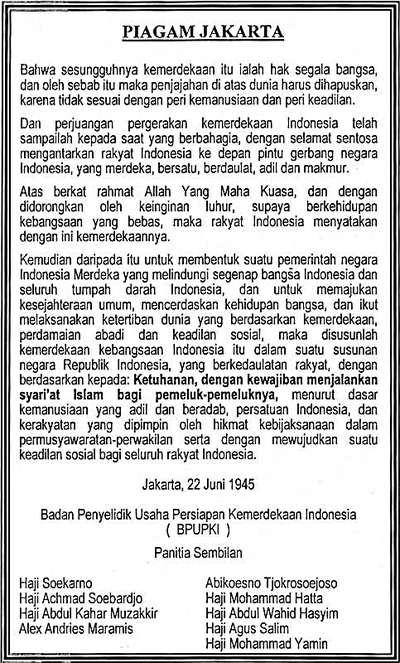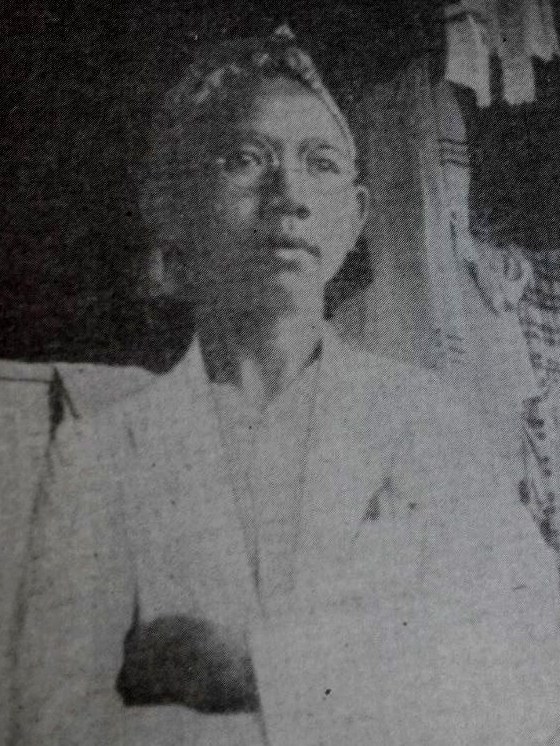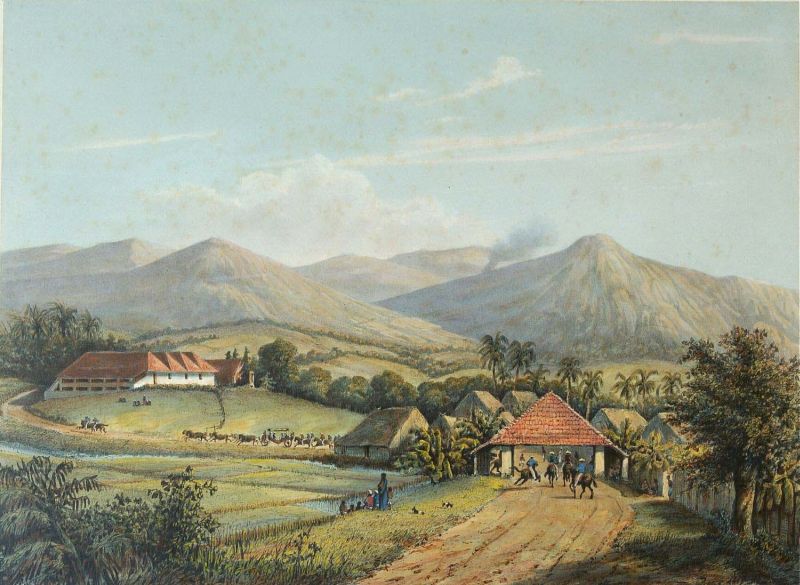|
Preparatory Committee For Indonesian Independence
The Preparatory Committee for Indonesian Independence (, abbreviated as PPKI; , Hepburn romanization, Hepburn: ) was a body established on 7 August 1945 to prepare for the transfer of authority from the Japanese occupation of the Dutch East Indies, occupying Japanese to Indonesia. It approved and promulgated the first Constitution of Indonesia, and appointed Sukarno and Mohammad Hatta as the first President of Indonesia, president and vice president of Indonesia, respectively. Background In two sessions from May to July 1945, the Investigating Committee for Preparatory Work for Independence (BPUPK) decided on Pancasila (politics), Pancasila as the ideological basis of independent Indonesia, and produced a draft constitution. With the war turning against them, the Japanese, who were Japanese occupation of the Dutch East Indies, occupying Indonesia, decided to grant independence in order to create problems for the returning Dutch colonial authorities. The plan was that Java would be ... [...More Info...] [...Related Items...] OR: [Wikipedia] [Google] [Baidu] |
Investigating Committee For Preparatory Work For Independence
The Investigating Committee for Preparatory Work for Independence (, abbreviated as BPUPK; , Hepburn: , Nihon-shiki / Kunrei-shiki: ), sometimes referred to, but better known locally, as the Investigating Committee for Preparatory Work for Indonesian Independence (, BPUPKI), was an organization set up on 1 March 1945 by the Japanese military authority in Java during the Japanese occupation of the Dutch East Indies as the initial stage of the establishment of independence for the area under the control of the Japanese 16th Army. The BPUPK held two plenary meetings; the first was from 28 May to 1 June 1945 and the second was between 10 and 17 July 1945. A BPUPK was also established in Sumatra. Background Realising Japan was losing the war, on 7 September 1944, in a session of the Japanese parliament, Prime Minister Kuniaki Koiso promised independence for the utch'East Indies' at "sometime in the future". The Japanese navy was not supportive of the idea, but the 25th Army in S ... [...More Info...] [...Related Items...] OR: [Wikipedia] [Google] [Baidu] |
Proclamation Of Indonesian Independence
The Proclamation of Indonesian Independence (, or simply ''Proklamasi'') was read at 10:00 Tokyo Standard Time on Friday 17 August 1945 in Jakarta. The declaration marked the start of the diplomatic and armed resistance of the Indonesian National Revolution, fighting against the forces of the Netherlands and pro-Dutch civilians, until the latter officially acknowledged Indonesia's independence in 1949. The document was signed by Sukarno and Mohammad Hatta, who were appointed president and vice-president respectively the following day. The date of the Proclamation of Indonesian Independence was made a public holiday by a government decree issued on 18 June 1946. Background The beginnings of the independence movement In 1918, the Dutch authorities in the Dutch East Indies established a partly-elected People's Council, the '' Volksraad'', which for the first time gave Indonesian nationalists a voice. Meanwhile, Indonesian students studying in the Netherlands formed the Perhimpo ... [...More Info...] [...Related Items...] OR: [Wikipedia] [Google] [Baidu] |
I Gusti Ketut Pudja
I Gusti Ketut Pudja (19 May 1908 – 4 May 1977) was an Indonesian politician and national hero, who served as the first governor of Lesser Sunda from 1945 until 1946. He was a member of the Investigating Agency for Preparatory Work for Indonesian Independence (BPUPK). He was also present at Admiral Tadashi Maeda's house, during the preparation for the Proclamation of Indonesian Independence on 17 August 1945. Making him the only Balinese to be present during the proclamation. Pudja was born on 19 May 1908 in Singaraja, Bali. He graduated from Rechtshoogeschool in Batavia (now Jakarta), and he started working in the Bali and Lombok Residency Office in Singaraja, in 1935. A year later, he was placed in the ''Raad van Kerta'', a court in Bali at that time. Pudja was a member of the Preparatory Committee for Indonesian Independence (PPKI), formed on 7 August 1945, to continue the work begun by the Investigating Committee for Preparatory Work for Independence (BPUPK). Followin ... [...More Info...] [...Related Items...] OR: [Wikipedia] [Google] [Baidu] |
Borneo
Borneo () is the List of islands by area, third-largest island in the world, with an area of , and population of 23,053,723 (2020 national censuses). Situated at the geographic centre of Maritime Southeast Asia, it is one of the Greater Sunda Islands, located north of Java Island, Java, west of Sulawesi, and east of Sumatra. The island is crossed by the equator, which divides it roughly in half. The list of divided islands, island is politically divided among three states. The sovereign state of Brunei in the north makes up 1% of the territory. Approximately 73% of Borneo is Indonesian territory, and in the north, the East Malaysian states of Sabah and Sarawak make up about 26% of the island. The Malaysian federal territory of Labuan is situated on a small island just off the coast of Borneo. Etymology When the sixteenth-century Portuguese explorer Jorge de Menezes made contact with the indigenous people of Borneo, they referred to their island as ''Pulu K'lemantang'', which ... [...More Info...] [...Related Items...] OR: [Wikipedia] [Google] [Baidu] |
Sulawesi
Sulawesi ( ), also known as Celebes ( ), is an island in Indonesia. One of the four Greater Sunda Islands, and the List of islands by area, world's 11th-largest island, it is situated east of Borneo, west of the Maluku Islands, and south of Mindanao and the Sulu Archipelago. Within Indonesia, only Sumatra, Borneo, and New Guinea, Papua are larger in territory, and only Java and Sumatra are more populous. The landmass of Sulawesi includes four peninsulas: the northern Minahasa Peninsula, the East Peninsula, Sulawesi, East Peninsula, the South Peninsula, Sulawesi, South Peninsula, and the Southeast Peninsula, Sulawesi, Southeast Peninsula. Three gulfs separate these peninsulas: the Gulf of Tomini between the northern Minahasa and East peninsulas, the Tolo Gulf between the East and Southeast peninsulas, and the Bone Gulf between the South and Southeast peninsulas. The Strait of Makassar runs along the western side of the island and separates the island from Borneo. Etymology The n ... [...More Info...] [...Related Items...] OR: [Wikipedia] [Google] [Baidu] |
Sam Ratulangi
Gerungan Saul Samuel Jacob Ratulangi (also written as ''Ratu Langie''; 5 November 1890 – 30 June 1949), known as Sam Ratulangi, was a Minahasan teacher, journalist, politician, and National Hero of Indonesia, national hero from North Sulawesi, Indonesia. He was part of the committee that ratified the Constitution of Indonesia and served as the first Governor of Sulawesi. Early life The son of Jozias Ratulangi and Augustina Gerungan, both from wealthy, well-respected Minahasa families, Sam Ratulangi was born on 5 November 1890 in Tondano in North Sulawesi, which at the time was a part of the Dutch East Indies. Jozias was a teacher at the ''Hoofden School'' (middle school for children of local village heads) in Tondano. He received teacher training in Haarlem, Netherlands around 1880. Augustina was the daughter of Jacob Gerungan, the ''Majoor'' (district chief) of Tondano-Touliang. Ratulangi was a gifted student, who studied at the local Dutch language elementary school (ELS o ... [...More Info...] [...Related Items...] OR: [Wikipedia] [Google] [Baidu] |
Teuku Muhammad Hasan
Teuku Mohammad Hasan ( EVO: Teoekoe Moehammad Hasan; 4 April 1906 – 21 September 1997) was an Indonesian politician and national hero from Aceh, who served as the first and only governor of Sumatra from 1945 until 1948. He also served as a cabinet minister in Sjafruddin Prawiranegara's emergency cabinet and was a member of both the Senate of the United States of Indonesia (USI) and the Provisional People's Representative Council (DPRS) of the Republic of Indonesia. Born to an aristocratic family in present-day Aceh, Teuku Mohammad Hasan studied law at Leiden University. During his time there, he joined the '' Perhimpoenan Indonesia'' association, becoming involved in the Indonesian independence movement. After graduating in 1933, he returned to Aceh, and became active in the Islamic organization Muhammadiyah. During the Japanese occupation, he was a member of the Preparatory Committee for Indonesian Independence. Following the proclamation of independence, he was appointed ... [...More Info...] [...Related Items...] OR: [Wikipedia] [Google] [Baidu] |
Sumatra
Sumatra () is one of the Sunda Islands of western Indonesia. It is the largest island that is fully within Indonesian territory, as well as the list of islands by area, sixth-largest island in the world at 482,286.55 km2 (182,812 mi.2), including adjacent islands such as the Simeulue Island, Simeulue, Nias Island, Nias, Mentawai Islands, Mentawai, Enggano Island, Enggano, Riau Islands, Bangka Belitung and Krakatoa archipelago. Sumatra is an elongated landmass spanning a diagonal northwest–southeast axis. The Indian Ocean borders the northwest, west, and southwest coasts of Sumatra, with the island chain of Simeulue, Nias, Mentawai Islands, Mentawai, and Enggano off the western coast. In the northeast, the narrow Strait of Malacca separates the island from the Malay Peninsula, which is an extension of the Eurasian continent. In the southeast, the narrow Sunda Strait, containing the Krakatoa archipelago, separates Sumatra from Java. The northern tip of Sumatra is near ... [...More Info...] [...Related Items...] OR: [Wikipedia] [Google] [Baidu] |
Oto Iskandar Di Nata
Oto Iskandar di Nata ( Sundanese: , also spelled Otto Iskandardinata, called Otista and nicknamed Si Jalak Harupat; born 31 March 1897 – disappeared 19 December 1945, retrospectively declared dead 20 December 1945) was an Indonesian politician and National Hero. Work In his activities during the period before independence, Oto served as Deputy Chairperson of the Bandung branch of Budi Utomo between 1921 and 1924, as well as Deputy Chairperson at the Pekalongan branch of Budi Utomo in 1924. At that time, he became a member of Pekalongan's Gemeenteraad (City Council) representing Budi Utomo. Oto was also active in the Sundanese cultural organization Paguyuban Pasundan. He became Secretary of the Executive Board in 1928 and became chairman between 1929 and 1942. The organization engaged in education, socio-cultural, political, economic, youth and women's empowerment. Oto also became a member of the Volksraad (People's Council), equivalent to the present-day national DPR, b ... [...More Info...] [...Related Items...] OR: [Wikipedia] [Google] [Baidu] |
Wahid Hasyim
Abdul Wahid Hasyim (1 June 1914 – 19 April 1953) was the first Minister of Religious Affairs in the government of President Sukarno of Indonesia, a post he held in 1945, and from 1949 to 1952. He was the son of Nahdlatul Ulama founder Hasyim Asy'ari and went on to lead the organization. In the future his son, Abdurrahman Wahid, also held the same office in NU, and later was elected as 4th President of Indonesia in 1999. One of the main roads in central Jakarta, Jalan Wahid Hasyim, is named after him. Early life Wahid was born in 1914 as a child of Hasyim Asy'ari and one of his wives, Nafiqoh. Both Asy’ari and Nafiqoh hailed from ulema families in East Java. Wahid is Asy'ari's first-born male and his fifth child. He spent most of his childhood in Jombang, which included attending a pesantren that his father founded, Pesantren Tebuireng. By 1926, he had finished his schooling in Tebuireng and spent two years continuing his education in various East Java pesantren as was ... [...More Info...] [...Related Items...] OR: [Wikipedia] [Google] [Baidu] |
Sutardjo Kertohadikusumo
Soetardjo Kartohadikusumo (22 October 1890 – 20 December 1976) was an Indonesian politician who served as the first Governor of West Java in 1945. A former member of the Volksraad, he was also renowned for the 1936 Soetardjo Petition. Early life and education Soetardjo was born on 22 October 1890 in the village of Kunduran, within what is today Blora Regency. He was the sixth of eight siblings. His father Kartoredjo was a district chief in Tuban. He began attending a ''Europeesche Lagere School'' (elementary school) at the age of 8, despite the age limit for such schools being 6; according to a book later published by the Ministry of Education and Culture, Kartohadikusumo "had to be made 2 years younger" to fit this age limit. He continued to study at a school for native bureaucrats (') in Magelang, during which he joined Budi Utomo and became chairman of its local office. Career After a one-month internship, he was appointed as an assistant scribe at the Rembang Residency o ... [...More Info...] [...Related Items...] OR: [Wikipedia] [Google] [Baidu] |
Java
Java is one of the Greater Sunda Islands in Indonesia. It is bordered by the Indian Ocean to the south and the Java Sea (a part of Pacific Ocean) to the north. With a population of 156.9 million people (including Madura) in mid 2024, projected to rise to 158 million at mid 2025, Java is the world's List of islands by population, most populous island, home to approximately 55.7% of the Demographics of Indonesia, Indonesian population (only approximately 44.3% of Indonesian population live outside Java). Indonesia's capital city, Jakarta, is on Java's northwestern coast. Many of the best known events in Indonesian history took place on Java. It was the centre of powerful Hindu-Buddhist empires, the Islamic sultanates, and the core of the colonial Dutch East Indies. Java was also the center of the History of Indonesia, Indonesian struggle for independence during the 1930s and 1940s. Java dominates Indonesia politically, economically and culturally. Four of Indonesia's eig ... [...More Info...] [...Related Items...] OR: [Wikipedia] [Google] [Baidu] |





